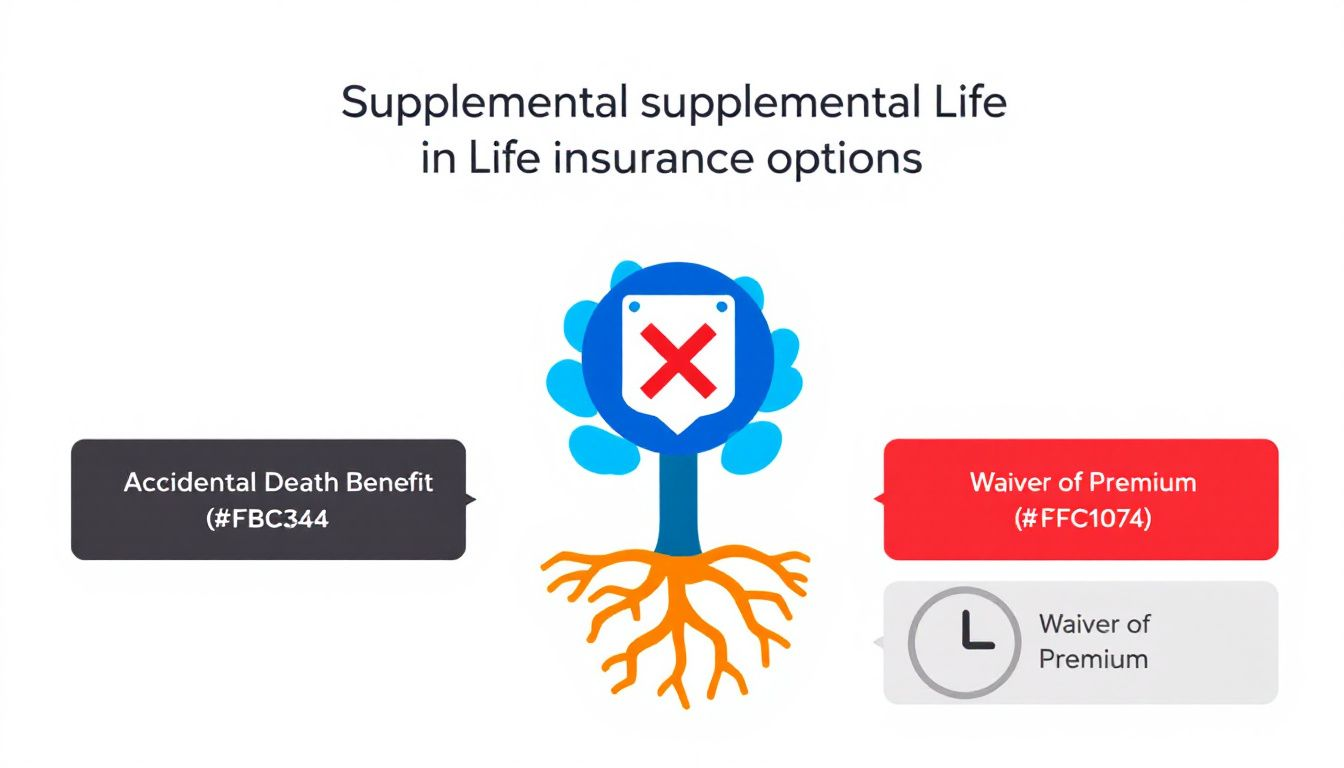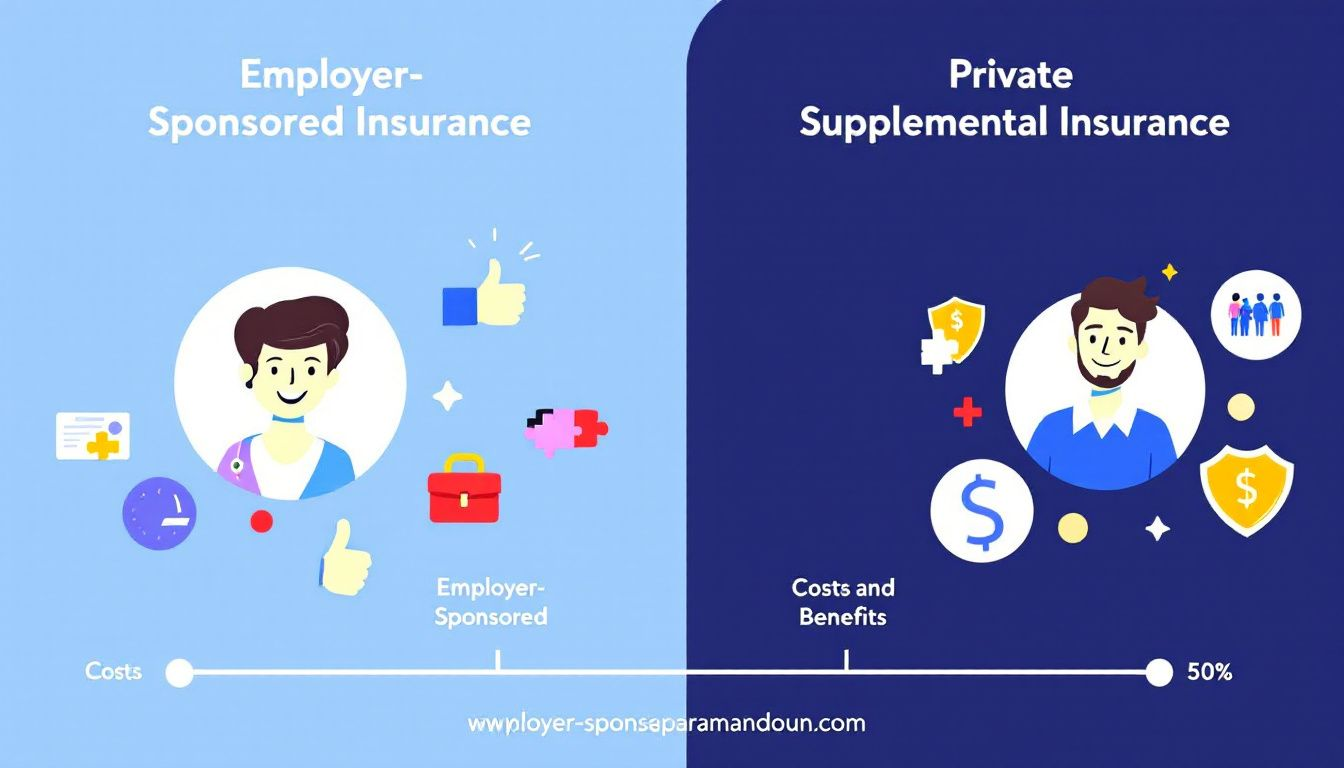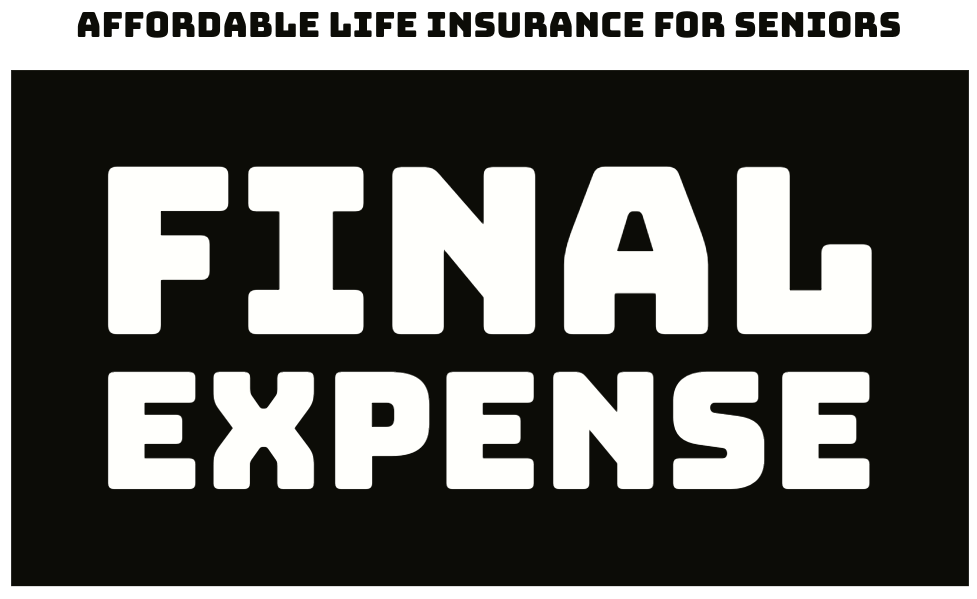Supplemental life insurance provides extra coverage beyond basic life insurance policies, ensuring your family has sufficient financial protection. If you find your employer’s basic life insurance falls short, this additional coverage can bridge the gap. Expect to learn what supplemental life insurance is, types available, needs assessment, and how to choose the right policy.
Key Takeaways
-
Supplemental life insurance provides additional financial protection for families beyond basic employer-provided coverage, helping to cover significant expenses such as mortgage payments and education costs.
-
There are two main types of supplemental life insurance: employer-sponsored, which is often more affordable but less portable, and private insurance, which offers more flexibility and personalized options.
-
When evaluating the need for supplemental insurance, consider current life insurance coverage, financial responsibilities, and future obligations, using methods like the DIME formula to determine appropriate coverage amounts.
Understanding Supplemental Life Insurance

Supplemental life insurance serves as an additional layer of financial protection for your loved ones. Its primary purpose is to provide extra coverage beyond the basic life insurance policy that many employers offer. For instance, if your employer’s basic life insurance only covers one or two years of your salary, that might not be sufficient to cover all your family’s financial needs in your absence. This is where supplemental life insurance steps in, offering more life insurance to bridge that gap, making supplemental life insurance worth considering.
The beneficiaries of supplemental life insurance will receive a payout upon the policyholder’s death, which can be used to cover various expenses such as mortgage payments, college tuition, and everyday living costs. This extra coverage ensures that your family can maintain their standard of living and meet future financial obligations without significant hardship.
Types of Supplemental Life Insurance Available
Supplemental life insurance comes in various forms to cater to different needs. The most common type is yearly renewable term life insurance, which provides coverage for a specified period and can be renewed annually. This type of insurance is often chosen for its affordability and straightforward coverage options.
Another essential aspect to consider is supplemental employee life insurance, which can include coverage for dependent children or a spouse, known as dependent supplemental life insurance. This ensures that all family members are protected under one plan. The cost of these plans can vary based on factors such as age, location, and the amount of coverage needed.
Moreover, if the basic life insurance provided by your employer is insufficient, exploring additional coverage options through private supplemental insurance can be beneficial. This allows you to tailor your life insurance policy to meet your specific financial protection needs, ensuring comprehensive coverage for you and your family.
Evaluating Your Need for Supplemental Coverage
Determining whether you need supplemental coverage involves assessing your financial responsibilities and future obligations. Having dependents or significant debts is a primary indicator that you might need additional life insurance. It’s crucial to consider both immediate financial needs, such as funeral expenses and outstanding debts, and long-term expenses like your children’s education and your spouse’s retirement needs.
Evaluate how much life insurance coverage you currently have through your employer and whether it covers these needs adequately. Many employees find that their basic employer-provided life insurance is not enough, especially if they have large families or significant financial obligations. When estimating the necessary amount of dependent life insurance, consider factors such as your spouse’s financial contributions, existing debts, monthly expenses, and future needs like college costs.
Additionally, it’s important to consider how inflation might affect future coverage needs and expenses. Before purchasing supplemental life insurance, evaluate your financial circumstances and specific insurance needs carefully to ensure that your family will be financially secure.
Employer-Sponsored vs. Private Supplemental Insurance

When it comes to choosing supplemental life insurance, you have two main options: employer-sponsored and private supplemental insurance. Employer-sponsored supplemental insurance is designed to enhance the basic life insurance coverage provided by many employers. Typically, these plans cover one to two years of an employee’s salary. However, employer-sponsored plans often lack portability, meaning the coverage might end if you change jobs.
Private supplemental insurance, on the other hand, offers flexibility and portability, allowing you to maintain your coverage regardless of your employment status. This type of insurance can be tailored to meet individual needs and provides stability of premiums, ensuring that your coverage remains intact even if you leave your job.
Recognizing the distinctions between these options can guide you in choosing the best way to secure additional coverage for your family.
Benefits of Employer-Sponsored Supplemental Insurance
Employer-sponsored employee supplemental life insurance offers several benefits that make it an attractive option for employees. One of the primary advantages is the cost. Since these policies are negotiated on a group level, they typically offer lower premiums compared to individual policies. Employers often provide favorable group rates, making it a cost-effective choice for employees.
Another significant benefit is the ease of obtaining coverage. Most employer-sponsored plans do not require a medical examination, which can be particularly advantageous for individuals with pre-existing health conditions. This accessibility ensures that more employees can secure additional financial protection without the hassle of undergoing health checks.
Drawbacks of Employer-Sponsored Supplemental Insurance
Despite its benefits, employer-sponsored supplemental insurance has some drawbacks. One of the key issues is the lack of portability. If you leave your job, your coverage typically ends unless it is portable, which can lead to significant gaps in your life insurance coverage. This can be a major drawback for those who frequently change jobs or are planning to retire soon.
Employer-sponsored plans may also offer limited employer sponsored coverage options, often covering only specific events like accidental death. This limitation can make it challenging to plan effectively for your financial security, as you may not have the comprehensive coverage needed to protect against various risks.
Advantages of Private Supplemental Insurance
Private supplemental insurance provides several advantages that cater to individual needs. Unlike employer-sponsored plans, a private insurance company is not tied to your employment status, offering flexibility and independence. This means you can maintain your coverage even if you change jobs or retire, ensuring continuous financial protection for your family.
Moreover, private supplemental insurance allows for more personalized coverage options. You can choose policies that best fit your financial goals and needs, providing stability of premiums and ensuring that your coverage remains unaffected by employment changes. This flexibility makes private supplemental insurance an excellent choice for those seeking comprehensive and long-term financial security.
How Much Supplemental Life Insurance Should You Purchase?
Determining how much supplemental life insurance to purchase can be daunting, but several methods can guide you. Professionals often suggest maintaining life insurance coverage ranging from five to ten times your annual income. This ensures that your family can cover immediate expenses and sustain their lifestyle in your absence.
One recommended approach is to calculate ten times your salary plus additional funds for future needs, such as college expenses. The DIME formula, which stands for Debt, Income, Mortgage, and Education, is another helpful tool to estimate your insurance needs. This method takes into account your outstanding debts, income replacement, mortgage payments, and educational expenses for your children.
A common guideline for those aged 18 to 40 is to consider purchasing life insurance equal to thirty times your income. Employer-provided basic coverage typically amounts to one to two times your salary, which may not be sufficient. Supplemental life insurance offers higher coverage limits, allowing you to tailor your policy to better meet your family’s financial needs and to understand how much coverage you might need.
Factors to Consider When Purchasing Supplemental Life Insurance
When purchasing supplemental life insurance, several factors must be considered to ensure you choose the right policy. The cost of premiums is influenced by demographic factors such as age and gender. Additionally, if a group life insurance policy exceeds $50,000 in coverage, the excess amount is taxed as income, making it essential to understand the tax implications of your policy.
Typically, medical exams are not required for supplemental employee life insurance, simplifying the process for many individuals. Premiums are determined based on your age, gender, and the desired amount of coverage. It’s crucial to thoroughly review the terms and conditions of the policy to avoid unexpected limitations or exclusions in coverage.
A licensed insurance agent can help you navigate the complexities of a supplemental life insurance policy and ensure you fully understand your options. Additionally, consider whether you want to purchase supplemental life insurance that includes options for additional riders, such as accidental death coverage, which can provide extra protection.
The Role of Term and Whole Life Insurance in Supplemental Coverage
Supplemental life insurance can be categorized into term, permanent, and family coverage options. Term supplemental life insurance is temporary, providing coverage for specific periods like 10 to 20 years. It is generally more cost-effective than whole life insurance due to its limited coverage period.
Permanent supplemental life insurance, such as whole and universal life, remains in effect as long as premiums are paid. Whole life policies accumulate cash value over time, offering both a death benefit and a savings component, though they can be significantly more expensive than term policies.
Combining term and whole life insurance can offer comprehensive coverage, addressing both short-term and long-term financial needs. This approach allows you to take advantage of the cost-effectiveness of term life while benefiting from the cash value accumulation of whole life insurance.
Special Considerations for Families
For families, supplemental life insurance provides crucial financial security in times of need. Many policies allow for purchasing coverage for spouses and children at reduced group rates, ensuring that all family members are protected. Premiums for spouses are generally higher than those for children, reflecting the financial impact of each dependent.
Ensuring coverage for dependents, including a spouse, domestic partner, and children, is vital for comprehensive family protection. This coverage helps cover essential costs such as college expenses and burial costs, providing peace of mind that your family’s financial future is secure.
Steps to Obtain Supplemental Life Insurance
Obtaining supplemental life insurance involves several steps. First, you will need to provide evidence of insurability, which includes detailed medical and personal information. This helps the insurer assess your risk and determine the appropriate premiums for your policy.
Once you’ve submitted the necessary information, you can choose the type and amount of coverage that best meets your needs. Consulting with a licensed insurance agent can help you navigate the options and ensure you select a policy that provides adequate protection for your family.
Summary
In summary, supplemental life insurance offers additional financial protection, ensuring your family is well-supported in your absence. Understanding the types of supplemental life insurance available, evaluating your need for additional coverage, and choosing between employer-sponsored and private options are crucial steps in securing your family’s financial future.
By considering factors such as coverage amount, policy terms, and special considerations for families, you can make informed decisions that provide peace of mind. Supplemental life insurance is a valuable tool in your financial planning arsenal, offering stability and security for your loved ones.
Frequently Asked Questions
What is supplemental life insurance?
Supplemental life insurance is extra coverage that enhances financial protection for your dependents, ensuring they can manage significant expenses beyond what is provided by your basic life insurance policy. This additional layer of security can be crucial for your family’s well-being in the event of your death.
Why should I consider purchasing supplemental life insurance?
Purchasing supplemental life insurance is advisable if your employer-provided coverage does not adequately support your family’s financial needs, as it can help cover significant expenses like mortgage payments and college tuition. This additional protection ensures your loved ones are financially secure in your absence.
What are the benefits of employer-sponsored supplemental life insurance?
Employer-sponsored supplemental life insurance offers lower premiums due to group rates and generally eliminates the need for a medical exam, enhancing accessibility for employees. This makes it a valuable option for securing additional financial protection for loved ones.
What are the drawbacks of relying solely on employer-sponsored supplemental life insurance?
Relying solely on employer-sponsored supplemental life insurance can be problematic due to lack of portability, as coverage may terminate upon leaving your job, and limited options that might not offer sufficient protection. It is advisable to consider additional personal life insurance to ensure comprehensive coverage.
How do I determine how much supplemental life insurance I need?
To determine the amount of supplemental life insurance you need, utilize methods like the DIME formula or calculate coverage based on a multiple of your annual income. Consulting with a licensed insurance agent is advisable to tailor the coverage to your family’s specific needs.
